VET APPROVED

The information is current and up-to-date in accordance with the latest veterinarian research.
Learn more »Click to Skip Ahead
Is your indoor cat obsessed with going outdoors? Cats love to explore, and it’s not unusual for an indoor cat to barrage their owners with requests to be let out outside. If you want to keep your cat exclusively indoors, though, this may lead to frustration due to the constant meowing at the door, especially if the cat’s indoor environment is not stimulating and entertaining enough.
Here are some of the possible reasons that your cat wants to be outside and a few things that you can do to deal with the situation.

The 6 Possible Reasons Your Cat Wants to Go Outside
1. They Want to Hunt
As natural predators, cats need to act on their natural hunting instincts. If they see other animals or birds outside, they instinctively want to chase them. This urge becomes even stronger if your cat isn’t getting enough stimulation indoors.
They must be mentally engaged and have outlets for their drive to hunt.
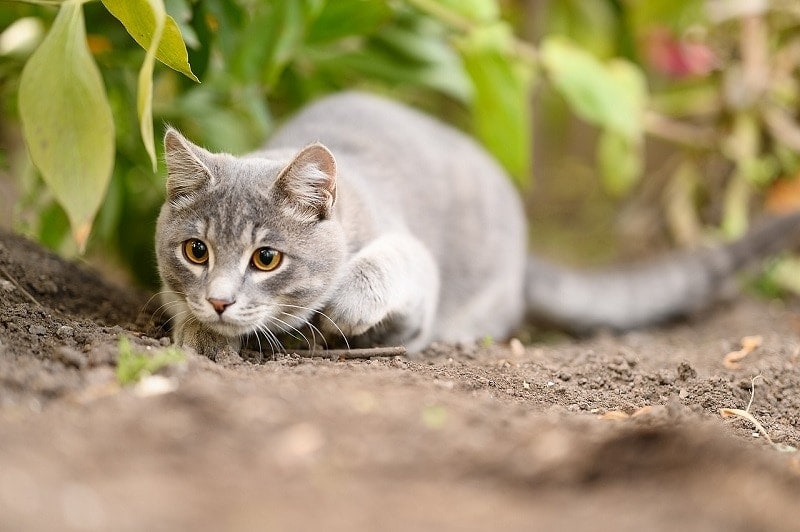
2. They Want to Explore
Outside is full of sights and smells that indoor cats don’t get to experience as much. Cats love to explore new things, so this may be the reason that they want out. They are also curious creatures that simply want to know what’s going on outside.
Maybe you have a dog that gets to wander out with you, but your cat doesn’t, and they want to know what’s so exciting beyond the door.
3. They Want Socialization
While we don’t think of cats as social animals, they do require a certain amount of social interaction. If your cat isn’t getting this need met, they may try to head outside to find other cats to socialize with.
Unfortunately, your cat doesn’t always understand that they may encounter something dangerous. They just want to hang out and play, especially if they see another cat outside. As well as establishing a social hierarchy, your cat may want to mark their territory to let the other cats know this is their backyard.
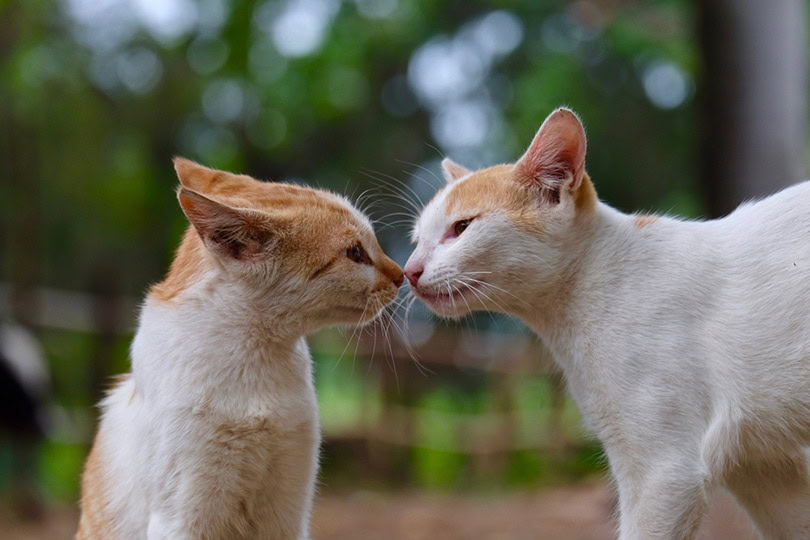
4. They Are Looking For a Mate
If you have an entire male or female cat, meaning they haven’t been neutered or spayed, as they mature sexually, they will start to show more interest in finding a mate. Female cats go into their first heat around 6 months of age, depending on their breed and size, and they may show a desire to go out to seek males when in heat. Similarly, entire males will have a need to roam in search of females, as soon as they reach their sexual maturity, again at around 6 months of age. They may start urine spraying indoors as well. Getting your cats spayed or neutered is the only way to minimize this behavior.
5. They Want to Follow You Outside
If you have a backyard where you spend a lot of the time, and you have a strong bond with your kitty, they may want to follow you out, so they can explore and play with you. One way to get them to join you on this adventure is to get them used to a harness and a leash.
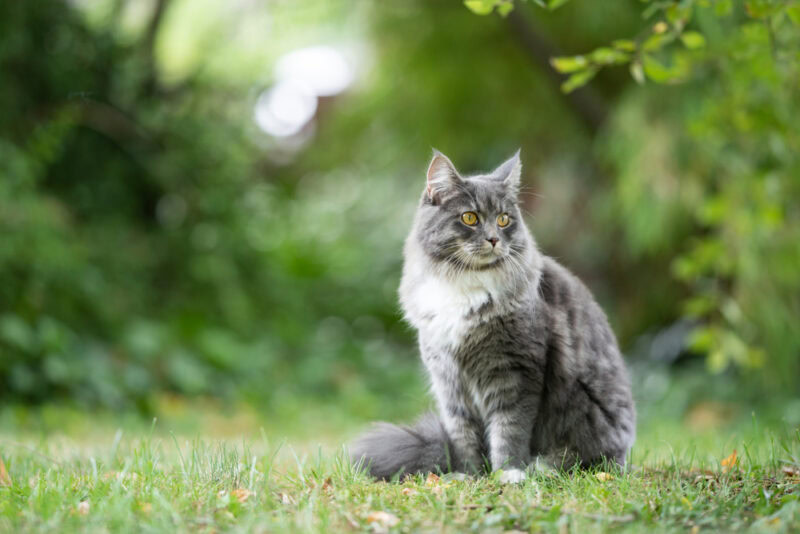
6. They Are Bored
Indoor cats can easily get bored if they aren’t getting enough physical activity, mental stimulation, and playtime, and if their environment is not sufficiently enriched. Indoor cats need to be able to exhibit their natural behaviors, such as stalking, pouncing, and imitating a hunt on toys, as well as scratching. They need plenty of space to run around, as well as perches and cat trees, access to window sills, scratch posts, and new and engaging toys.

Ways to Stop the Meowing from Being Let Out
If your cat is annoying you with their constant requests to go outside, there are a few things that you can do about it. Here are six ways to stop (or at least reduce) your cat’s demands.
1. Leash Train Your Cat and Take Them for Walks
If you’re not inclined to let your cat roam outdoors alone, there is one way that you can let them explore safely. It is relatively easy to leash train your cat, and you can take them for daily walks while keeping them safely attached to you.
Scheduling a daily outdoor walk will satisfy your kitty’s need for fresh air, sunshine, and curiosity and keep them safe from lurking dangers.
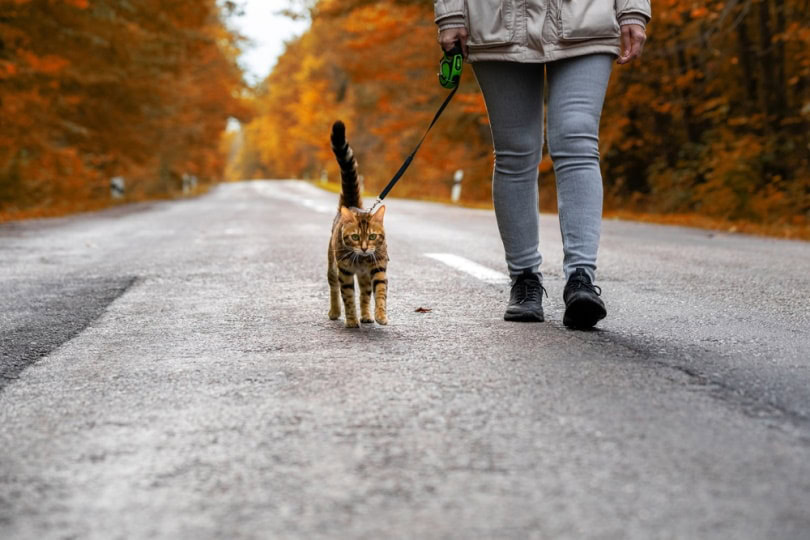
2. Don’t Reward Undesirable Behavior
Cats easily understand which behaviors are rewarded (i.e., get them what they want) and which behaviors are not rewarded. If something has no payoff, your cat won’t continue doing it. You may be unintentionally causing the incessant meowing by rewarding it. Rewards can be in the form of petting, giving your cat attention, or even taking them for a walk every time they demand it.
Ignoring your cat when they meow to go outside, and rewarding quiet, calm behavior will help reduce the behavior. Take your cat for a walk only when they are quiet and not meowing at the door. Your cat will quickly learn that making demands doesn’t get them what they want.
3. Provide an Enriching Environment
Cats that are well-stimulated indoors are less likely to want out. This can include having puzzle toys, scratchers, and playtime. Creating comfortable resting spaces where your kitty can lie in the sun or a spot where they can watch a bird feeder outside the window will meet their needs without them leaving the house.
Small changes in the environment can make a big difference. Rotate your cat’s toys to avoid boredom, or try catnip or cat grass to make things more exciting.
As another option, if you're looking to give your cat something exciting, we know of an awesome scratcher that both encourages play and doubles as a stylish modern furniture piece. The Hepper Hi-Lo Cat Scratcher is designed with a curved shape for dynamic movement, is built to last with safe and sturdy birch plywood and thick cardboard, and offers three height options to ensure your cat enjoys the exercise, elevation, and excitement they crave ... and, it's affordable!
At PangoVet, we've admired Hepper for many years, and decided to take a controlling ownership interest so that we could benefit from the outstanding designs of this cool cat company!
4. Create a Safe Outdoor Space
A catio or an enclosed outdoor space can enable your cat to experience the outdoors without wandering out of your yard. There are many options to keep your cat contained and still give them the ability to explore safely.
5. Spay or Neuter Your Cat
Cats that aren’t spayed or neutered have a natural desire to roam in search of a mate. Males, in particular, will try to escape at the first chance that they get. Spaying or neutering your cat can prevent these instincts from kicking in altogether.
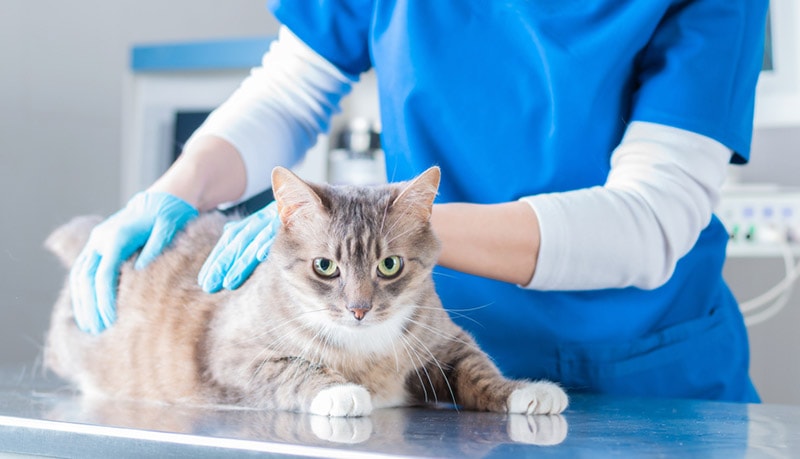
6. Give Your Cat Adequate Love and Attention
Even the most independent felines want love and attention at least some of the time. How much attention a cat needs depends on the individual. Some cats are happy to be alone and only interact with you for a few minutes each day, while others want to be your constant companion.
Regardless of their personality, making your cat part of the family and regularly offering playtime, petting, and cuddles will make them want to stay rather than leave. In many cases, cats just don’t realize that you want to hang out with them. Make sure they know that they are loved.
Before diving into the pros and cons of indoor and outdoor cats, it is important to note that if you’re unsure about any risks and/or benefits, a consultation with a vet can be super beneficial.

Potential Pros & Cons of Outdoor Cats
We can’t tell you whether to let your cat outside or keep them in, as everyone has different preferences. We can give you the information that you need to make an informed choice about doing so. There are advantages and disadvantages to letting your cat out and vice versa.
Pros of Outdoor Cats
- They have greater opportunities for exercise.
- Cats that roam outdoors are less likely to become ov
- Outdoor cats can indulge their natural curiosity.
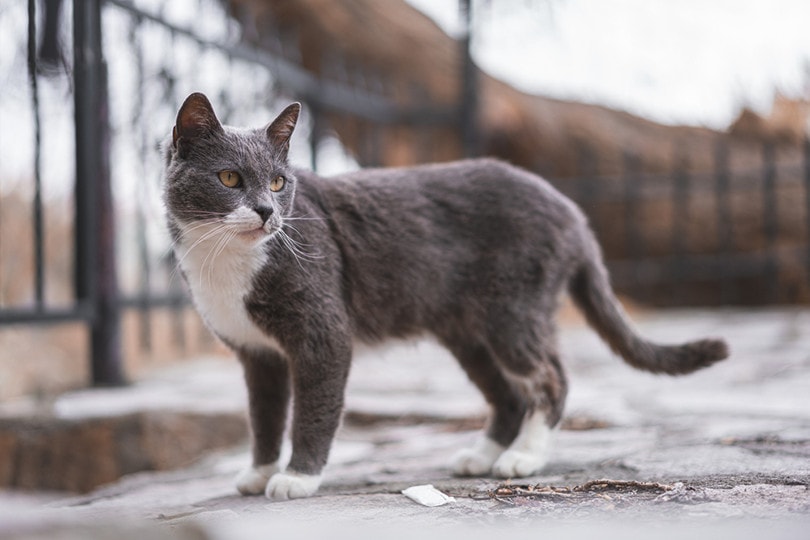
Cons of Outdoor Cats
- Outdoor cats have shorter lifespans due to the dangers outside.
- There is more exposure to infectious
- They are more likely to pick up parasites or experience flea and tick infestations.
- Outdoor cats face dangers from predators, humans, and vehicles.
- Unspayed cats risk pregnancy.
- Stray cats often fight with other cats.
- Outdoor cats are a significant danger to small mammal and bird populations.

Potential Pros & Cons of Indoor Cats
Pros of Indoor Cats
- You don’t have to worry about your cat getting hurt
- Indoor cats are less likely to contract a disease or pick up parasites
- Indoor cats live longer and are less likely to get lost
- There are little to no risks of exposure to poison, vehicles or inclement weather
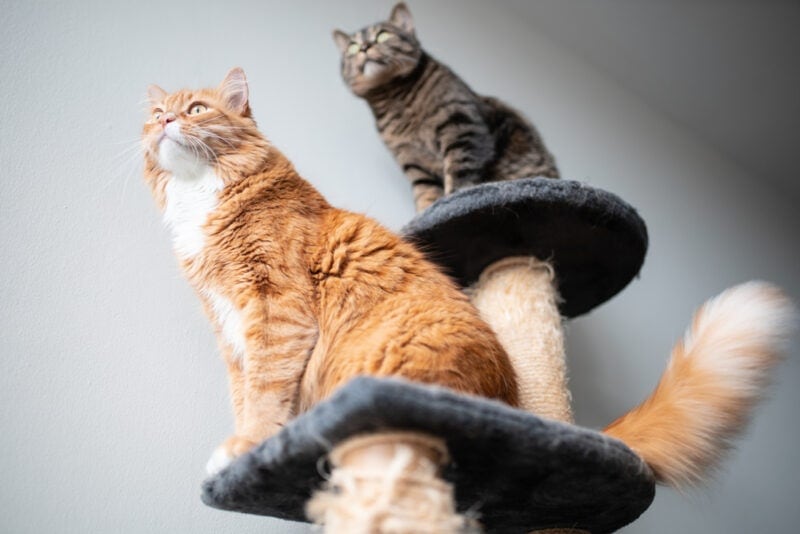
Cons of Indoor Cats
- Indoor living can cause boredom if there isn’t appropriate environmental enrichment
- Some indoor cats suffer from anxiety and exhibit undesirable behaviors
- They need to be adequately exercised and stimulated mentally every single day
- Indoor cats are at higher risk for obesity

Are Cats Happier Outside?
No, not all cats are happier outside. Some are, but this differs between individual cats. As a rule, cats that have never been outside will be happier than cats that have been. It’s difficult to take a cat that has had the freedom to explore outdoors and make them an exclusively indoor cat. One that has been indoors from birth is much more likely to enjoy their time inside, as long as all of their needs are met, from physical activity, mental stimulation to environmental enrichment.
Most cats enjoy time outdoors, but they are unaware of the impending dangers, especially if they have never been exposed to them, not to mention the detrimental effects they have on local wildlife.


Conclusion
If your cat constantly demands to go outside, there are a few different reasons for it. Also, there are pros and cons to keeping your cat indoors or letting them outside, and only you can decide which option is best, depending on your area. Providing proper stimulation, exercise, and playtime for an indoor cat will help prevent the constant demands of going outdoors.
Another option is to take your cat for walks or create a contained, safe outdoor space for your cat. This gives them fresh air and sunshine without exposing them to the potential risks of outdoor life.
See Also:
- Is It Wrong to Keep My Cat Indoors All the Time? (Vet Answer)
- Can Indoor Cats Become Outdoor Cats? Tips, Risks & Alternative Solutions
Featured Image Credit: Africa Studio, Shutterstock
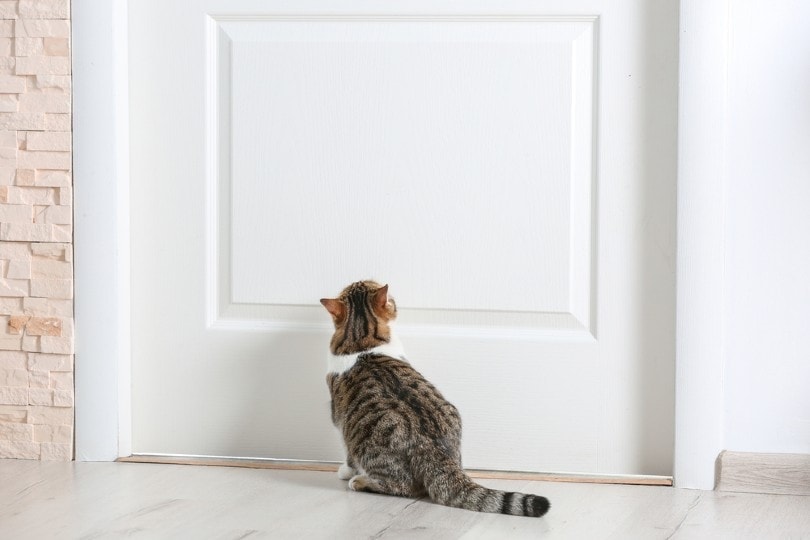








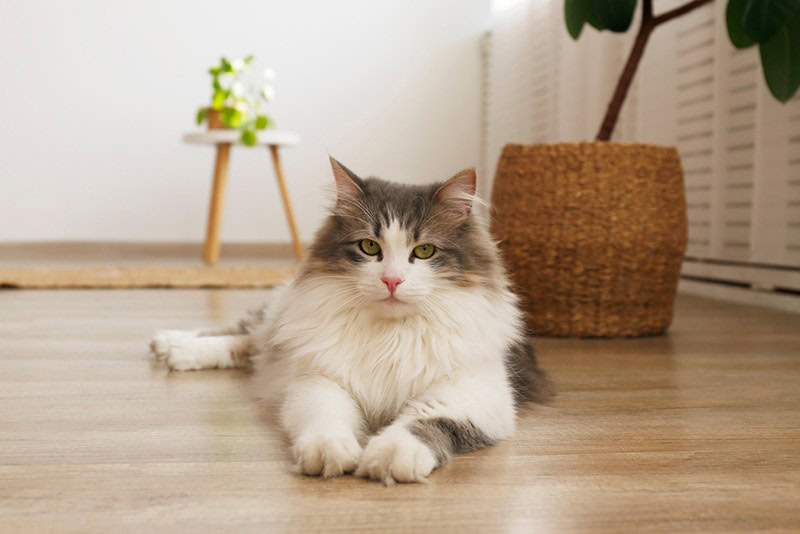




2 Responses
ummm … I’m a home alone guy … kitty cat shows up one day in my yard … so I make friends with him and find out that he is also a Indoor cat .. because he knows what the sand box is for … so I feed him can cat food exclusively … but he is a out door cat and he prefers to spend his time out side … he has his freedom to come and go as he pleases … I keep the front door open a Crack… but he don’t like it when it’s raining or super windy or snowing or too cold … he comes in late in the evening, for a quick bit of food and then goes out the door for an hour or so and then comes back in and jumps into my lap and curlys up in my arms and tucks his head under my chin and goes to sleep for about an hour and then wakes up and settles down in his bed fir the night and sleeps till 5am and then wakes me up and wants out … lol … sometimes I take him for a short ride in the truck …
Thank you so much for sharing this heartwarming story with us! It is admirable that you’ve decided to take care of this cat and great to hear that they pay you back with love and trust. Best of luck to both of you!